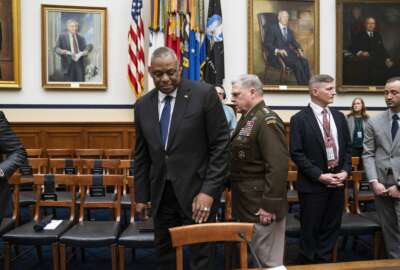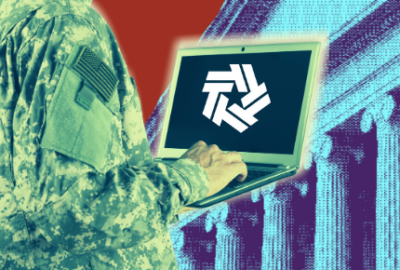

Congress is planning to give the National Archives and Records Administration significant funding to dig out from a pandemic-era backlog that's kept veterans from...
Congress is planning to give the National Archives and Records Administration significant funding to dig out from a pandemic-era backlog that’s kept veterans from applying for federal benefits.
The compromise House and Senate lawmakers reached Tuesday night on the National Defense Authorization Act (NDAA) would give NARA $60 million to address the backlog of veterans’ requests for military service records at the National Personnel Records Center (NPRC) in St. Louis.
The NDAA would allow NARA to spend the $60 million on updating its IT systems and electronic records archive, and improving the turnaround for Freedom of Information Act requests.
The NDAA funding to address the records backlog stems from the Access for Veterans to Records Act, which the House passed in July.
The defense policy bill marks the biggest investment in NARA to date to address its backlog.
The Technology Modernization Fund in May invested $9.1 million in NARA to address the backlog of requests for veterans’ records, which are required for veterans to receive medical treatment, unemployment assistance and other benefits from the Department of Veterans Affairs.
The investments will go toward creating a cloud-based platform for the records, enabling NARA staff to more quickly and securely deliver veterans’ records requests.
The NDAA would ensure that NARA maintains “staffing level and telework agreements that enable the maximum processing of records requests,” and set the goal of NARA responding to 90% of records requests received within 20 days or less.
The backlog reached a height of 600,000 requests earlier in the COVID-19 pandemic, when mandatory telework policies made it difficult for NPRC staff to access its largely paper-based archive of military records. As of late September, the backlog dropped to approximately 440,000 cases.
Colleen Shogan, the Biden administration’s nominee to lead NARA as National Archivist of the United States, told the Senate Homeland Security and Governmental Affairs Committee in September that the veteran records backlog would be the “most important discrete problem” she would face if confirmed.
Meanwhile, the VA’s Office of Automated Benefit Delivery is preemptively scanning military records for veterans who may file an initial claim for benefits under the recently passed PACT Act. The VA begins to adjudicate those claims in January.
The VA expects to digitize all PACT Act claims received so far in the second quarter of fiscal 2023. As of Sept. 28, it digitized about 38% of the 170,000 PACT Act files received so far.
The NDAA gives NARA 60 days to come up with a plan to reduce the backlog of requests for military service records held at the NPRC and improve the efficiency and responsiveness of its operations.
The backlog reduction plan must include a current estimate of the number of backlogged record requests, a timeline to reduce the backlog and steps the agency can take to improve customer service for requesters. Lawmakers are also mandating NPRC provide “measurable goals” and metrics to track progress toward its backlog reduction goals.
NPRC must also come up with strategies to prevent future record requests backlogs, “including backlogs caused by an event that prevents employees of the center from reporting to work in person.”
The NDAA would also require the NARA inspector general’s office to report on progress made to address the backlog two years out from the bill becoming law.
The NDAA also looks outlines steps for VA to ensure it has the staffing it needs, and that the pay it offers its health care workforce remains competitive with the private sector.
The legislation requires the VA to conduct annual base and locality pay surveys for health care positions at medical centers, in an effort to ensure competitive pay rates.
The NDAA would have the directors of VA’s 171 medical centers report the results of the annual base and locality pay surveys to the VA secretary, who would then submit those findings to the House and Senate VA committees every year.
The bill also gives the VA a year to come up with a staffing model for its Vet Centers, which provide community-based counseling services to veterans trying to transition from military to civilian life, or recovering from traumatic events.
The VA is already rolling out additional pay and bonus authority for health care employees as part of the PACT Act, and expects to implement all of its workforce provisions before the end of the calendar year.
The agency is also asking Congress for higher salary caps for VA physicians, dentists and podiatrists as part of an omnibus spending package for the rest of fiscal 2023.
Everett Kelley, the national president of the American Federation of Government Employees, said in a statement Wednesday that the compromise version of the NDAA, while missing some key civil service protections, would “improve pay and working conditions for civil service employees both inside and outside the Department of Defense,” and achieve many of the union’s top legislative priorities for the year.
“I urge the House and Senate to pass this legislation swiftly and send it to President Biden for his signature,” Kelley said.
The NDAA also protects agency watchdogs from being removed from office by the president or the head of an agency.
The bill requires the president or the head of an agency to give Congress 15 days’ notice before putting an agency inspector general on non-duty status, and provide a “substantive rationale” for doing so.
The president or agency head may still put an IG on immediate non-duty status if the individual’s presence in the workplace poses a threat to OIG employees, evidence relevant to an OIG investigation or would “otherwise jeopardize legitimate government interests.”
The NDAA would also set a higher bar for who the president could name as an acting inspector general, if the permanent IG dies, resigns cannot perform the functions and duties of the position.
The bill specifies the president may only name an OIG employee with at least 90 days of experience in the IG’s office to serve as acting IG.
The acting IG must also have a “demonstrated ability in accounting, auditing, financial analysis, law, management analysis, public administration, or investigations.”
The NDAA would also require the president to submit a nominee to serve as permanent IG within 210 days of the position becoming vacant. If not, the president will have to notify Congress and provide an explanation for why a nominee hasn’t been submitted.
Copyright © 2025 Federal News Network. All rights reserved. This website is not intended for users located within the European Economic Area.
Jory Heckman is a reporter at Federal News Network covering U.S. Postal Service, IRS, big data and technology issues.
Follow @jheckmanWFED


